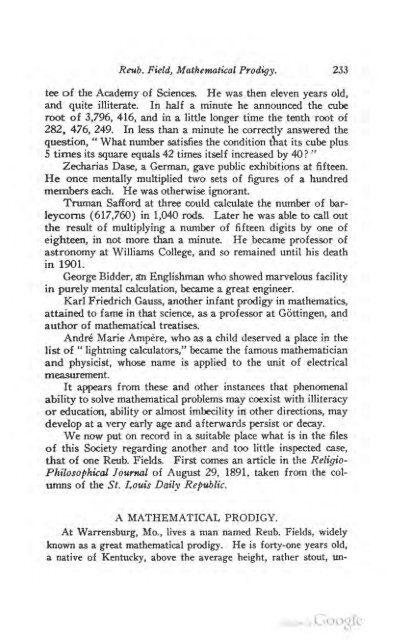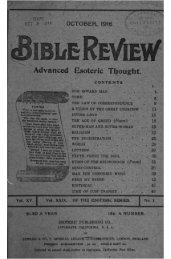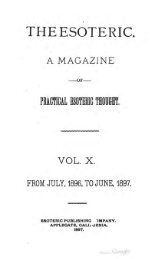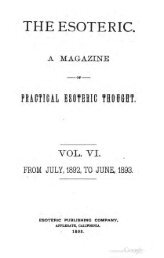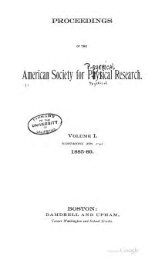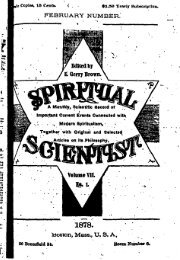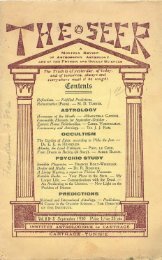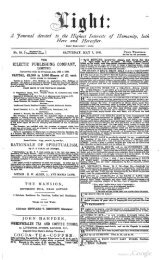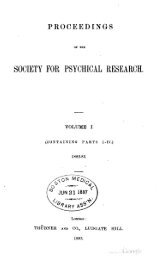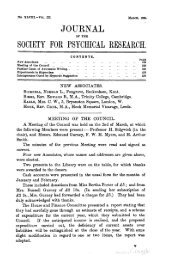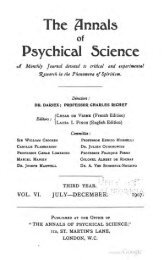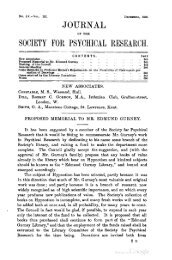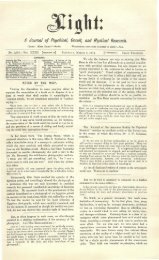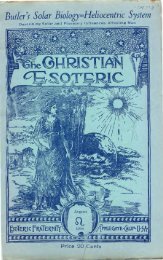- Page 1:
JOURNAL OF THE American Society for
- Page 9 and 10:
Illusions in Psychical Research. 3
- Page 11 and 12:
Illusions in Psychical Research. 5
- Page 13 and 14:
Illusions in Psychical Research. 7
- Page 15 and 16:
Three Evidential Chenoweth Sittings
- Page 17 and 18:
Three Evidential Chenoweth Sittings
- Page 22:
16 Jour11al of the American Society
- Page 26 and 27:
20 Journal of the American Society
- Page 28 and 29:
22 Journal of the American Society
- Page 30 and 31:
24 Journal of the American Society
- Page 32:
26 JourtUZl of the American Society
- Page 39 and 40:
Three Evidential Chenoweth Sittings
- Page 43 and 44:
Three Evidential Chetwweth Sittings
- Page 45:
Three Evidential Chenoweth Sittings
- Page 48 and 49:
42 Jour11al of the American Society
- Page 51:
Predictions Fulfilled. 45 utterance
- Page 54 and 55:
48 Journal of the American Society
- Page 56:
50 Journal of the American Societ)
- Page 60:
54 Journal of the American Society
- Page 65 and 66:
Book Reviews. 59 problem of the sup
- Page 67 and 68:
Book Reviews. 61 municators that th
- Page 69:
Books Received. 63 BOOKS RECEIVED.
- Page 81:
Survey and C ommcnt. Pledged in add
- Page 85 and 86:
Incipient M ediumship. 75 the meres
- Page 87 and 88:
Incipient Mediumship. 77 give me so
- Page 92 and 93:
82 Journal of the American Society
- Page 94:
84 Journal of the American Society
- Page 100:
90 Journal of the American Society
- Page 103 and 104:
Incipient M ediumship. 93 ment excl
- Page 105 and 106:
Incipient Mcdiumship. 95 Cemetery w
- Page 107:
Incipient Mediumship. 97 the mind o
- Page 111:
Experiments in Psychometry. 1'01 Ch
- Page 115 and 116:
Experiments in Psychometry. lOS the
- Page 117 and 118:
Incidents. 107 • witness, as it s
- Page 119:
Incidents. 109 hired his team, went
- Page 123 and 124:
Incidents. 113 H. Taft, Sunday, Mar
- Page 125 and 126:
Incidents. 115 "As near as we can r
- Page 132 and 133:
118 Joumal of the American Society
- Page 134 and 135:
120 Joumal of the American Society
- Page 136 and 137:
122 Journal of the American Society
- Page 138 and 139:
124 Journal of tlte American Societ
- Page 142 and 143:
128 Journal of the American Society
- Page 144 and 145:
130 Journal of the American Society
- Page 147 and 148:
Consulting Spirits. 133 the past le
- Page 150 and 151:
136 Journal of the American Society
- Page 152 and 153:
138 Journal of the American Society
- Page 156 and 157:
142 lottrnal of the American Societ
- Page 158 and 159:
144 Journal of the American Society
- Page 160 and 161:
146 Journal of the American Society
- Page 163:
Observations of a Jurist. 149 Heali
- Page 168:
154 Journal of the American Society
- Page 171 and 172:
Incidents. 157 time being allowed f
- Page 174 and 175:
160 Journal of the American Society
- Page 177 and 178:
JOURNAL OF THE AMERICAN SOCIETYfor
- Page 180 and 181:
162 Journal of the American Society
- Page 182:
164 Joumal of the American Society
- Page 185 and 186:
Recent Experiments Contimud. 167 te
- Page 188 and 189:
170 -Journal of the American Societ
- Page 191 and 192:
Recmt Experiments c-ontinued. 173 m
- Page 195 and 196:
Recent Experiments Continued. 177 a
- Page 198:
180 Journal of the American Society
- Page 203 and 204: Recent Experiments Continued. 185 s
- Page 205: Recent Experiments Continued. 187 a
- Page 208 and 209: 190 Journal of the American Society
- Page 210: 192 Journal of the American Society
- Page 216 and 217: 198 Jour11al of tlae American Socid
- Page 219: A u Psychometric" Experiment. 201 f
- Page 223 and 224: • A " P sychonr-etric " Experinum
- Page 225 and 226: A "Psychometric" Experiment. 207 La
- Page 228 and 229: 210 ltmrnal of tlte American Societ
- Page 232 and 233: 214 Journal of the American Society
- Page 238: 220 Jourual of tile Americmr Societ
- Page 243: VOLUME XIV No. 5 MAY, 1920 JOURNAL
- Page 250 and 251: 228 l01lrnal of the American Societ
- Page 253: Kant and Spiritualism. 231 physics"
- Page 259 and 260: Reub. Field, M athema.tical Prodigy
- Page 263 and 264: Reub. Field, Mathematical Prodigy.
- Page 274 and 275: 252 Journal of the American Society
- Page 276: 254 Journal of the American Society
- Page 280: 258 Journal of the American Society
- Page 285 and 286: \ .. Fig. I. riJ.(. [J I. '· ·':
- Page 287 and 288: 1at Ex. Incidents. 263 Digitized by
- Page 292: THE AMERICAN SOCIETY FOR PSYCHICAL
- Page 298 and 299: 270 Journal of the American Society
- Page 300: \ 272 lottrnal of the American Soci
- Page 306 and 307:
278 lcmrnal of the American Society
- Page 308 and 309:
280 Journal of the American Society
- Page 310 and 311:
282 lottrnal of the American Societ
- Page 312 and 313:
284 Journal of the American Society
- Page 314 and 315:
286 Joumal of the American Society
- Page 316 and 317:
2nd Experiment, 1st Exposure, Aug.
- Page 319 and 320:
Znd Experiment, 2nd Exposure, Aug.
- Page 321 and 322:
Experiments for Phasmatographs. 289
- Page 325 and 326:
3rd Experi111ent, 2nd Exposure, Aug
- Page 329 and 330:
4th Experiment, Aug. 21. Test condi
- Page 331 and 332:
Experiments for Phasmatographs. 295
- Page 337:
Experiments for Phasmatographs. 301
- Page 340:
.. -. . . .· . ... : : : ·.· ...
- Page 344 and 345:
306 Journal of the American Society
- Page 347:
Correspondence. CORRESPONDENCE. ANA
- Page 352:
314 Journal of the American Society
- Page 360 and 361:
318 Journal of the American Society
- Page 363 and 364:
War Predictions through Mrs. Chenow
- Page 366:
324 ltmrnal of the American Society
- Page 369:
War Predictions through Mrs. Chenow
- Page 374 and 375:
332 ]QUnuzl of the American Society
- Page 376 and 377:
334 Journal of the American Society
- Page 378 and 379:
336 Journal of the American Society
- Page 380:
338 Journal of the American Society
- Page 386 and 387:
344 Journal of the American Society
- Page 388:
346 Journal of the American Society
- Page 393:
War Predictions through MrS. Chenow
- Page 396:
354 Journal of the American Society
- Page 402 and 403:
360 hmrnal of the American Society
- Page 405:
Peculiar Experiences Connected with
- Page 411:
Peculiar E%periences Connected with
- Page 417:
Book Reviews. 375 BOOK REVIEWS. Rea
- Page 420:
378 Journal of the American Society
- Page 424:
THE ENDOWMENT OF THB AMERICAN INSTI
- Page 429 and 430:
Survey and Comment. 383 are qualifi
- Page 432:
386 Journal of the American Society
- Page 435:
A Notable Psychometric Test. 389 sh
- Page 438 and 439:
392 lourttal of the American Societ
- Page 443:
A Notable Psychometric Test. 397 Th
- Page 446 and 447:
4,00 Journal of the American Societ
- Page 448:
402 Journal of the American Society
- Page 453 and 454:
A Notable Psychometric Test. 407 th
- Page 456:
410 Journal of the American Society
- Page 462 and 463:
416 Jour11al of the American Societ
- Page 465:
Book Reviews. 419 The remainder of
- Page 471:
PURPOSE AND SCOPE OF THE SOCIETY +
- Page 478:
4:26 Journal of the American Societ
- Page 482:
430 Journal of the American Society
- Page 487 and 488:
Entrance Upon Psychical Research. 4
- Page 491 and 492:
Entrance Upon Psychical Research. 4
- Page 493 and 494:
In Menwry of Dr. Hyslop. 441 ated f
- Page 495:
In Memory of Dr. Hyslop. 443 the co
- Page 501:
Vision and Service. 449 established
- Page 512 and 513:
460 J our11al of tlte A merica11 So
- Page 514:
4:62 JourMI of the American Society
- Page 519:
. Early Environment and Schooling.
- Page 533 and 534:
Digitized by Coogle .... ... . . ·
- Page 536:
4.78 Journal of the American Societ
- Page 539:
My Father. 481 nearly ended. Even t
- Page 549 and 550:
A Reminiscence. 491 the limited pow
- Page 552:
4;94 Journal of the American Societ
- Page 555 and 556:
A Ten Years' Fellowship. 49i than I
- Page 557 and 558:
A Friendship. 499 to him, we are to
- Page 560 and 561:
502 Journal of the American Socidy
- Page 564 and 565:
506 Journal of the American Society
- Page 566 and 567:
508 Jourual of the American Society
- Page 570:
512 Journal of tlte American Societ
- Page 575 and 576:
Brief Tributes E:rcerpted from Lett
- Page 577:
Brief Tributes Excerpted from Lette
- Page 581 and 582:
Extracts from Editorials. 523 of Dr
- Page 583:
Extracts from Editorials. 525 ment.
- Page 587:
PURPOSH AND SCOPE OF THE SOCIETY +
- Page 592 and 593:
530 Journal of the American Society
- Page 594 and 595:
532 Journal of the American Society
- Page 596 and 597:
534 Journal of the American Society
- Page 598 and 599:
536 Journal of the American Society
- Page 600 and 601:
538 Journal of the American Society
- Page 602:
540 hJUrnal of the American Society
- Page 606:
..544 Journal of the America" Socie
- Page 611 and 612:
Experiments in Telekinesis. 549 tio
- Page 613 and 614:
Experiments in Telekinesis. 551 (If
- Page 616:
554 Journal of the American Society
- Page 620:
558 Journal of the American Society
- Page 628:
566 lcntrnal. of the American Socie
- Page 631 and 632:
The Oracles of BaJaam. This is the
- Page 633:
A Reminiscence. A REMINISCENCE OF A
- Page 636:
574 Journal of the American Society
- Page 639 and 640:
A MATERIAL MEDIUM. By GERTRUD£ 0.
- Page 641 and 642:
A Mat erial Medium. 579 sit in the
- Page 644 and 645:
582 Jot4rnal of the American Societ
- Page 651:
PURPOSE AND SCOPE OF THE SOCIETY +
- Page 656:
590 Joumal of the American Society
- Page 659:
Survey and Comment. 593 "It (referr
- Page 662:
, .. 596 Journal of the American So
- Page 665 and 666:
Clairvoyant (!) Dream. 599 Hemmeter
- Page 667 and 668:
Clairvoyant (f) Dream. 601 dream. I
- Page 669 and 670:
Clairvoyant (f) Dream. 603 It is di
- Page 672:
606 Journal of the American Society
- Page 676 and 677:
610 JourJlal of the American Societ
- Page 678:
612 l01trnal of the American Societ
- Page 683:
Additional·Notes on Two Books. 617
- Page 687:
Additional Notes on T·wo Books.·
- Page 696:
630 Journal of tlw American Society
- Page 703 and 704:
Incidents. 637 NASHUA, April 18, 19
- Page 705 and 706:
Ma. RicHARD HooosoN, Boston. Incide
- Page 707 and 708:
Book Reviev.us. 641 BOOK REVIEWS. M
- Page 710 and 711:
Sc:ientiata Scientists and Psychica
- Page 712:
Frank Frank; Rev. Henry: 382. Frenc


